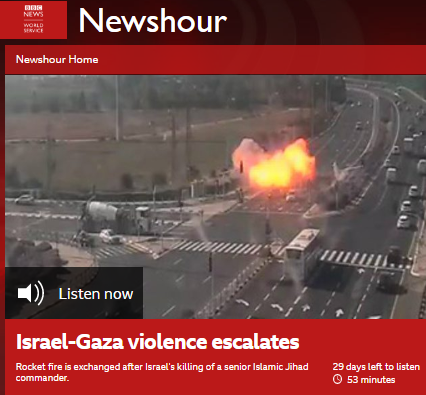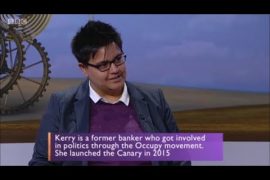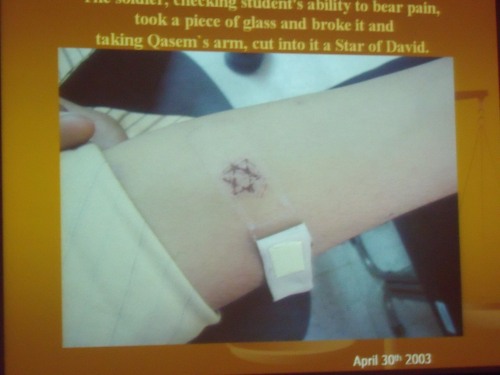As we saw in an earlier post, in the lead item in the November 12th evening edition of the BBC World Service radio programme ‘Newshour’ presenter Paul Henley and Jerusalem based reporter Barbara Plett Usher managed to spend five minutes discussing that morning’s strike on a senior Palestinian Islamic Jihad commander and the hundreds of subsequent missile attacks against Israeli civilians while diligently avoiding the use of the words ‘terror’, ‘terrorism’ or ‘terrorists’.
Notably, the only reference to the victims of those attacks heard in that item came in the form of two very brief recorded statements from Israelis who were not identified, their locations not disclosed and what actually happened to them and their property left unexplained.
In contrast, ‘Newshour’ producers did find it appropriate to devote the item’s last four minutes of airtime to the views of an inadequately introduced “resident of Gaza”.
[emphasis in italics in the original, emphasis in bold added]
Henley [from 05:42 here]: “Najla is a resident of Gaza and she gave me her reaction to the assassination of Baha Abu al-Ata and the exchange of fire that’s followed.”
Once again Henley made no effort to clarify to listeners around the world that while Israeli strikes targeted Palestinian Islamic Jihad rocket launchers and infrastructure, the rockets fired by the PIJ and other factions targeted Israeli civilians.
Najla: “Every few weeks we have some kind of an episode of escalation but this time is quite different. I would say it started with this…the serious assassination of the Islamic Jihad leader which was perceived by people in Gaza as a major event that reminds us in Gaza with some previous wars…ah…bigger significant escalations. So it is serious and people are very concerned over…”
Henley [interrupts]: “Is he a well-known figure in Gaza this man who’s been killed?”
Najla: “He is but usually the names are not very popular because they don’t go public. They’re not on media or anything but usually within the factions they have big position, big status I would say so…”
Henley [interrupts]: “But among citizens there, among people living in Gaza, will it be a big deal that he personally has been killed?”
Najla: “I mean anyone who would be killed by Israel is an issue to…”
Henley [interrupts]: “That’s not what I’m asking though. Is this a particularly significant figure to the general population of Gaza?”
Najla: “Being who he is as part of Islamic Jihad, as a leader, yes. But the name may not be known very much by the general public.”
Henley: “And does the firing of rockets from Gaza into Israel have support among people you know?”
Najla: “To put it in a way that this is how Palestinian factions have been partially responding to such violations by Israel on such attacks but you also should remember that the situation in Gaza has been fuelling for the past years without any resolution and…”
Henley [interrupts]: “I suppose what I’m… I suppose what I’m trying to find out is whether there is generally public support in Gaza for firing more rockets into Israel in direct response to this killing.”
Najla: “People do expect that this to happen. Some agree and some disagree. I can’t give you exact figures on how popular exactly this kind of response is.”
At that point Henley abandoned his obscure line of questioning and provided his interviewee with an uninterrupted one minute and forty second platform from which to promote her unchallenged claims.
Henley: “Sure. How worried are you the situation will spiral into more violence on both sides now though?”
Najla: “We are very worried to be honest and we are waiting to see how things develop tonight. It’s been already a heavy day since 5:30 a. m. this morning but it’s been like the past hour or so kind of quiet and everyone is just watching, watching the news and waiting to see what will come out. So we are greatly worried. We’ve been through this before and unfortunately people in Gaza are…have lost hope in resolving the situation because it’s been just failing…we’ve been failed by everyone and we’ve been punished by all sides. And the situation is really dramatically deteriorating within Gaza in terms of the very basic aspects of life. We’re under blockade, we’re under serious restrictions. Two million people are not able to move, not able to work, the increase of unemployment is massive and I think that this doesn’t make news unfortunately. But people’s lives are being really compromised by the day and everyone, even those who consider themselves advantaged, they do suffer from basic rights such as movement, electricity, proper water etcetera. And the economic situation is deteriorating dramatically and people would probably know that unemployment has reached the highest around the world. So the situation has been really boiling and unfortunately people are not hopeful.”
Henley of course did not challenge the debatable claim that the Gaza Strip has the highest unemployment rate in the world (47% according to the latest figures from the World Bank as opposed to 50% in Syria and 48% in Senegal). Neither did he bother to provide any context to Najla’s claims concerning electricity and water or to explain the background to the blockade.
Najla is in fact Najla Shawa who works for Oxfam and was previously an UNRWA employee. Since 2015 she has been repeatedly interviewed by the BBC – including by Henley – more often than not without proper identification and with no information given to BBC audiences concerning her “particular viewpoints”.
And so, just as it did a year ago, while civilians in Israel were under relentless attack from rockets launched by terrorists in the Gaza Strip, the BBC found it appropriate to all but ignore their voices and instead to spend four minutes showcasing an unchallenged ‘voice from Gaza’.
Related Articles:
‘Quite forthcoming with the confrontational approach’: guess what the BBC is describing
BBC News avoids the word terror in report on strike on terrorist
BBC Radio 4: nothing to see in southern Israel, move along to Gaza




